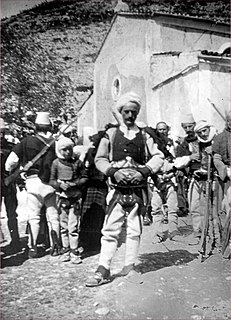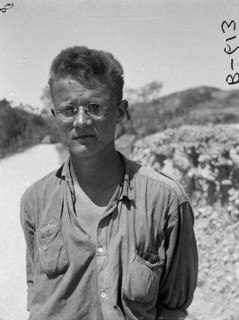Related Research Articles

Anthropology is the scientific study of humanity, concerned with human behavior, human biology, cultures and societies, in both the present and past, including past human species. Social anthropology studies patterns of behaviour, while cultural anthropology studies cultural meaning, including norms and values. Linguistic anthropology studies how language influences social life. Biological or physical anthropology studies the biological development of humans. Visual anthropology, which is usually considered to be a part of social anthropology, can mean both ethnographic film as well as the study of "visuals", including art, visual images, cinema etc. Oxford Bibliographies describes visual anthropology as "the anthropological study of the visual and the visual study of the anthropological".

A society is a group of individuals involved in persistent social interaction, or a large social group sharing the same spatial or social territory, typically subject to the same political authority and dominant cultural expectations. Societies are characterized by patterns of relationships between individuals who share a distinctive culture and institutions; a given society may be described as the sum total of such relationships among its constituent of members. In the social sciences, a larger society often exhibits stratification or dominance patterns in subgroups.

The term tribe is used in many different contexts to refer to a category of human social group. The predominant usage of the term is in the discipline of anthropology. The definition is contested, in part due to conflicting theoretical understandings of social and kinship structures, and also reflecting the problematic application of this concept to extremely diverse human societies. The concept is often contrasted by anthropologists with other social and kinship groups, being hierarchically larger than a lineage or clan, but smaller than a chiefdom, nation or state. These terms are equally disputed. In some cases tribes have legal recognition and some degree of political autonomy from national or federal government, but this legalistic usage of the term may conflict with anthropological definitions.

A hunter-gatherer is a human living in a society in which most or all food is obtained by foraging. Hunter-gatherer societies stand in contrast to agricultural societies, which rely mainly on domesticated species, although the boundaries between the two are not distinct.
In political science, a political system defines the process for making official government decisions. It is usually compared to the legal system, economic system, cultural system, and other social systems. However, this is a very simplified view of a much more complex system of categories involving the questions of who should have authority and what the government influence on its people and economy should be.
A band society, sometimes called a camp, or in older usage, a horde, is the simplest form of human society. A band generally consists of a small kin group, no larger than an extended family or clan. The general consensus of modern anthropology sees the average number of members of a social band at the simplest level of foraging societies with generally a maximum size of 30 to 50 people.
Political anthropology is a subfield of sociocultural anthropology, but like anthropology as a whole, it remains immune to precise delimitation. The core of political anthropology is the comparative, fieldwork-based examination of politics in a broad range of historical, social, and cultural settings.
A chiefdom is a form of hierarchical political organization in non-industrial societies usually based on kinship, and in which formal leadership is monopolized by the legitimate senior members of select families or 'houses'. These elites form a political-ideological aristocracy relative to the general group.
Sociocultural evolution, sociocultural evolutionism or cultural evolution are theories of sociobiology and cultural evolution that describe how societies and culture change over time. Whereas sociocultural development traces processes that tend to increase the complexity of a society or culture, sociocultural evolution also considers process that can lead to decreases in complexity (degeneration) or that can produce variation or proliferation without any seemingly significant changes in complexity (cladogenesis). Sociocultural evolution is "the process by which structural reorganization is affected through time, eventually producing a form or structure which is qualitatively different from the ancestral form".

Elman Rogers Service (1915–1996) was an American cultural anthropologist.
The expression adaptive strategies is used by anthropologist Yehudi Cohen to describe a society’s system of economic production. Cohen argued that the most important reason for similarities between two unrelated societies is their possession of a similar adaptive strategy. In other words, similar economic causes have similar sociocultural effects.
A tribal chief or chieftain is the leader of a tribal society or chiefdom.

A stateless society is a society that is not governed by a state. In stateless societies, there is little concentration of authority; most positions of authority that do exist are very limited in power and are generally not permanently held positions; and social bodies that resolve disputes through predefined rules tend to be small. Stateless societies are highly variable in economic organization and cultural practices.
In social anthropology, a sodality is a non-kin group organized for a specific purpose, and frequently spanning villages or towns.
Nutritional anthropology is the study of the interplay between human biology, economic systems, nutritional status and food security. If economic and environmental changes in a community affect access to food, food security, and dietary health, then this interplay between culture and biology is in turn connected to broader historical and economic trends associated with globalization. Nutritional status affects overall health status, work performance potential, and the overall potential for economic development for any given group of people.
Jeanne E. Arnold, Ph.D., is an archaeologist who teaches in the anthropology department at the University of California, Los Angeles. Her fields of research cover many topics, but she specializes in the prehistoric and early contact era of the Pacific Coast of North America, in California and British Columbia. Her work in these areas has been directed to resolving the economies and political evolutionary trajectories of complex hunter-gatherer groups.
Political Economy in anthropology is the application of the theories and methods of historical materialism to the traditional concerns of anthropology, including, but not limited to, non-capitalist societies. Political Economy introduced questions of history and colonialism to ahistorical anthropological theories of social structure and culture. Most anthropologists moved away from modes of production analysis typical of structural Marxism, and focused instead on the complex historical relations of class, culture and hegemony in regions undergoing complex colonial and capitalist transitions in the emerging world system.
The archaeology of trade and exchange is a sub-discipline of archaeology that identifies how material goods and ideas moved across human populations. The terms “trade” and “exchange” have slightly different connotations: trade focuses on the long-distance circulation of material goods; exchange considers the transfer of persons and ideas.
A Subsistence Pattern – alternatively known as a subsistence strategy – is the means by which a society satisfies its basic needs for survival. This encompasses the attainment of nutrition, water, and shelter. The five broad categories of subsistence patterns are foraging, horticulture, pastoralism, agriculture, and industrial food production.
The history of archaeology in the Philippines, officially known as the Republic of the Philippines, has been affected by many significant figures and the multiple chronologies associated with the type of artifacts and research conducted over the years.
References
- Elman Service, Primitive Social Organization (1962), Profiles in Ethnology (1963), Origins of the State and Civilization (1975)